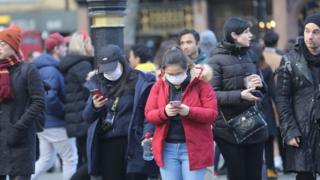
 Image copyright
Image copyright
Getty Images
England’s contact tracers have only reached about 50% of people who have been in close contact with someone with Covid-19 in an area of Lancashire where new cases are rising.
The figure was revealed by Prof Dominic Harrison, public health director of Blackburn with Darwen Council.
He warned of “exponential growth” of new infections if the system did not become more efficient.
The government said the NHS scheme had helped identify thousands of cases.
It is not clear why the contacts provided were not able to be reached.
The government’s most recent statistics reveal that of the people in England who tested positive for Covid-19 between 2-8 July, 17.1% could not be reached and a further 4.1% did not provide their phone number.
It said 71.1% of the contacts provided were reached, but 21.8% of those who originally tested positive said they had not been in close contact with anyone during the required time frame.
A leaked report, seen by the Independent, suggested that fewer than half of contacts were reached in Oldham, St Helens, Manchester and Rochdale.
Speaking to BBC Radio 4’s Broadcasting House programme, Prof Harrison said that Blackburn with Darwen in Lancashire, which he oversees, faces a “rising tide” of infections.
“The key issue here is that 40% of people who are infected by someone with Covid-19 who goes for tests because they have symptoms, will be infected by them before they have those symptoms,” said Prof Harrison.
“So, there’s a 48 hour window which is critical to get the contacts of the first case contacted, and if we don’t get them contacted, and if they don’t then get tested and self-isolated, and they then have symptoms, we do risk the spread progressing.”
It later emerged that the Jamia Ghosia mosque in Blackburn said it is being investigated by the police and public health officials after holding a funeral on 13 July, attended by 250 people.
The Imam has since tested positive for coronavirus and is recovering.
The mosque has emailed its congregation advising everybody to self-isolate and said it “made a mistake” in allowing more than the officially-permitted 30 mourners to attend.
Local test and trace
Prof Harrison called for testing and tracing to be carried out at a local rather than national level, and for Public Health England to share more data with local authorities.
Prof Harrison said PHE had only begun sharing data about the postcode areas in which new infections were being registered on 29 June.
“That has made a great difference in three weeks for us in being able to identify what our local outbreak issue is,” he said.
“Had we had that data much earlier in this pandemic, I think we could have made progress much more rapidly.”
In response the Department for Health and Social Care said the NHS test and trace scheme had so far “helped test and isolate more than 180,000 cases”.
“The service is working closely with local authorities across England to help manage local outbreaks and data is shared daily,” it added.
It also urged anyone with coronavirus symptoms to seek a test and self-isolate immediately.
“The service relies on everyone playing their part – please book a test if you have symptoms, self-isolate and help us trace anyone you’ve been in contact with.”
‘World-beating’
The NHS test and trace scheme is a crucial part of the government’s plan for managing the spread of the virus.
It began on 1 June and Prime Minister Boris Johnson claimed it would be “world beating”.
Sage, a committee of medical experts which advises the government, has said that at least 80% of contacts would need to isolate for the test and trace system to be effective.


